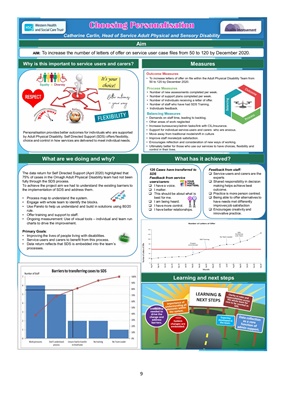
9
126 Cases have transferred to
SDS
Feedback from service
users/carers:
I have a voice.
I matter.
This should be about what is
best for me.
I am being heard.
I have more control.
I have better relationships.
Personalisation provides better outcomes for individuals who are supported
by Adult Physical Disability. Self Directed Support (SDS) offers flexibility,
choice and control in how services are delivered to meet individual needs.
Catherine Carlin, Head of Service Adult Physical and Sensory Disability
Why is this important to service users and carers? Measures
Learning and next steps
Aim
AIM: To increase the number of letters of offer on service user case files from 50 to 120 by December 2020.
What has it achieved?
What are we doing and why?
The data return for Self Directed Support (April 2020) highlighted that
75% of cases in the Omagh Adult Physical Disability team had not been
fully through the SDS process.
To achieve the project aim we had to understand the existing barriers to
the implementation of SDS and address them.
• Process map to understand the system.
• Engage with whole team to identify the blocks.
• Use Pareto to help us understand and build in solutions using 80/20
rule.
• Offer training and support to staff.
• Ongoing measurement: Use of visual tools - individual and team run
charts to drive the improvement.
Primary Goals:
• Improving the lives of people living with disabilities.
• Service-users and carers to benefit from this process.
• Data return reflects that SDS is embedded into the team's
processes.
Feedback from staff:
Service-users and carers are the
experts
Shared responsibility in decision
making helps achieve best
outcome.
Practice is more person centred.
Being able to offer alternatives to
have needs met differently
improves job satisfaction
Encourages creativity and
innovative practice.